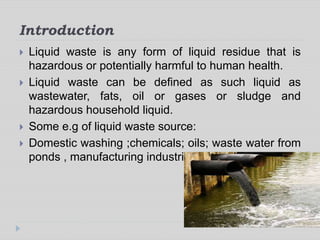An Unbiased View of Reclaim Waste
An Unbiased View of Reclaim Waste
Blog Article
Reclaim Waste Things To Know Before You Get This
Table of ContentsThe Best Guide To Reclaim WasteGetting The Reclaim Waste To Work9 Easy Facts About Reclaim Waste ExplainedThe Main Principles Of Reclaim Waste Little Known Questions About Reclaim Waste.
Domestic sewer waste refers to the waste and products from a household septic storage tank. The correct management and disposal of residential sewage waste call for fluid waste to be transferred to a sewage therapy plant where the proper techniques and devices are applied to cleanse and dispose of waste.
Business waste frequently consists of potential risks, such as flammable materials or a blend of fluid and solid waste products, and calls for an advanced and comprehensive disposal process. The disposal of business waste commonly involves the filtration of waste prior to transport to make certain secure and appropriate disposal. Hazardous waste is produced from byproducts and overflow of commercial procedures and manufacturing.
This kind of waste can not use the very same sewage management transport or procedures as septic or commercial fluids. The commercial waste monitoring process needs the inspection and screening of fluid waste before it undertakes the disposal process (liquid waste removal). Drainage waste is the liquid waste that comes from drainage and excess stormwater in very populated areas or cities
Runoff waste can cause contamination and flooding otherwise handled properly. Find out a lot more about sewage system cleaning and waste monitoring. Making certain appropriate waste monitoring can stop disasters and lower ecological harm. Both individuals in residential setups and experts in business or production industries can profit from recognizing the processes and guidelines of fluid waste administration.
A Biased View of Reclaim Waste
Call PROS Services today to discover our waste management and disposal solutions and the correct ways to care for the liquid waste you create.
(https://www.huntingnet.com/forum/members/reclaimwaste1.html)Do you know what happens to your water when you disengage, purge the toilet or drain the cleaning machine? No? Well, it deserves recognizing. This supposed 'wastewater' is not only an important resource yet, after therapy, will be launched to our land, waterways or the ocean. Used water from toilets, showers, baths, kitchen area sinks, laundries and commercial procedures is referred to as wastewater.

water made use of to cool equipment or clean plant and equipment). Stormwater, a type of wastewater, is overflow that moves from farming and city locations such as roofs, parks, yards, roadways, courses and rain gutters into stormwater drains pipes, after rain. Stormwater moves without treatment directly to regional creeks or rivers, ultimately reaching the ocean.
The smart Trick of Reclaim Waste That Nobody is Discussing
In Queensland, most wastewater is dealt with at sewer therapy see here now plants. Wastewater is transferred from domestic or commercial sites through a system of sewage systems and pump terminals, called sewerage reticulation, to a sewage treatment plant. Local governments construct, maintain and operate most sewage treatment plants. Operators are licensed under the Environmental Defense Act 1994 to discharge treated wastewater at an acceptable environmental criterion right into rivers.
The Division of Natural Resources encourages city governments regarding managing, operating and maintaining sewage systems and therapy plants. In unsewered locations, city governments may require householders to install individual or home sewer treatment systems to deal with residential wastewater from commodes, cooking areas, restrooms and washings. The Department of Natural Resources authorises making use of family systems when they are proven to be reliable.
In some brand-new class, treatment of some stormwater to get rid of litter, sand and gravel has started using gross toxin catches. Wastewater therapy occurs in four phases: Gets rid of solid issue.
Wastewater then streams into large tanks where solids work out and are gotten rid of as sludge. Grease and residue are skimmed from the surface. Uses little living organisms referred to as micro-organisms to damage down and eliminate staying dissolved wastes and fine particles. Micro-organisms and wastes are incorporated in the sludge. Eliminates nitrogen and phosphorus nutrients that could cause algal blooms in our rivers and threaten aquatic life.
The Basic Principles Of Reclaim Waste
Nutrient elimination is not readily available whatsoever sewer therapy plants due to the fact that it needs costly specialized tools. It is becoming extra typical in Queensland. Clear liquid effluent generated after therapy may still contain disease-causing micro-organisms. If this effluent is launched into waterways such as rivers or the sea, the micro-organisms will ultimately pass away out.

This typically implies wastewater needs to be treated or contaminants removed prior to it can be released to waterways. A lot of wastewater moves into the sewerage system. Under the Act, city governments carry out approvals and permits for environmentally relevant activities (Periods) involving wastewater releases that may have a regional effect. The division carries out approvals and permits to Periods including wastewater launches that could have a local or statewide effect.
Reclaim Waste Fundamentals Explained
Or else, examples are considered laboratory evaluation. Usually lots of tests are required to establish the degrees of each of the various pollutants such as oils, hefty steels and chemicals in water. Monitoring offers accurate info regarding water high quality and can validate that permit problems are being satisfied. The info acquired with tracking offers the basis for making water quality choices.
Report this page